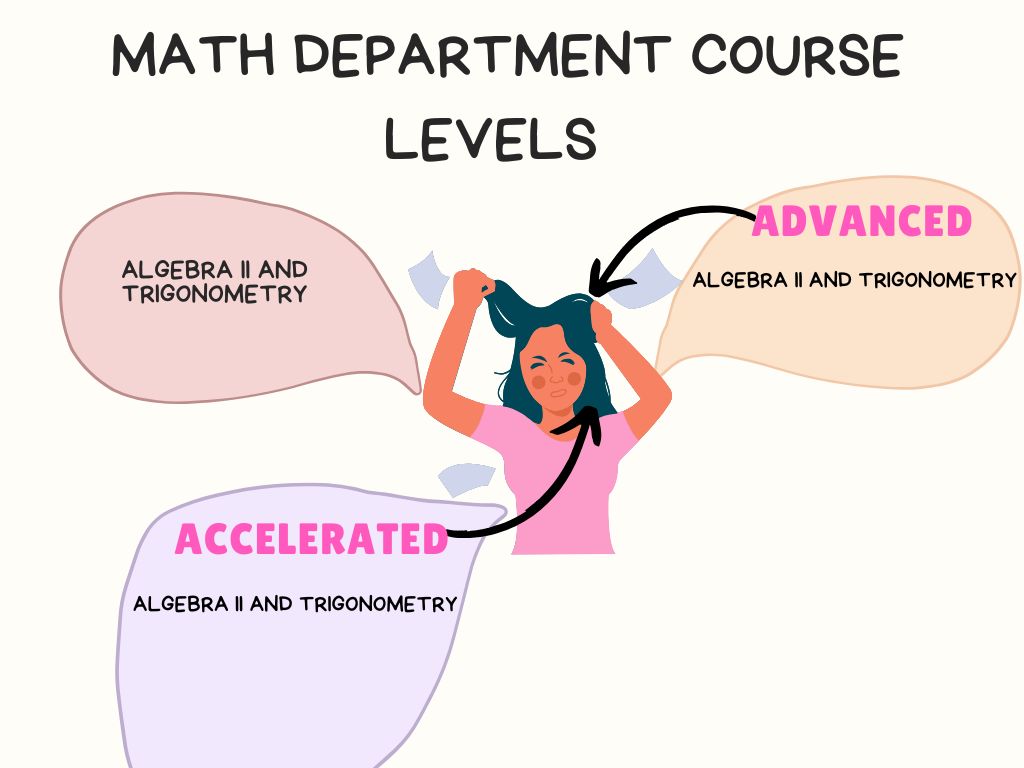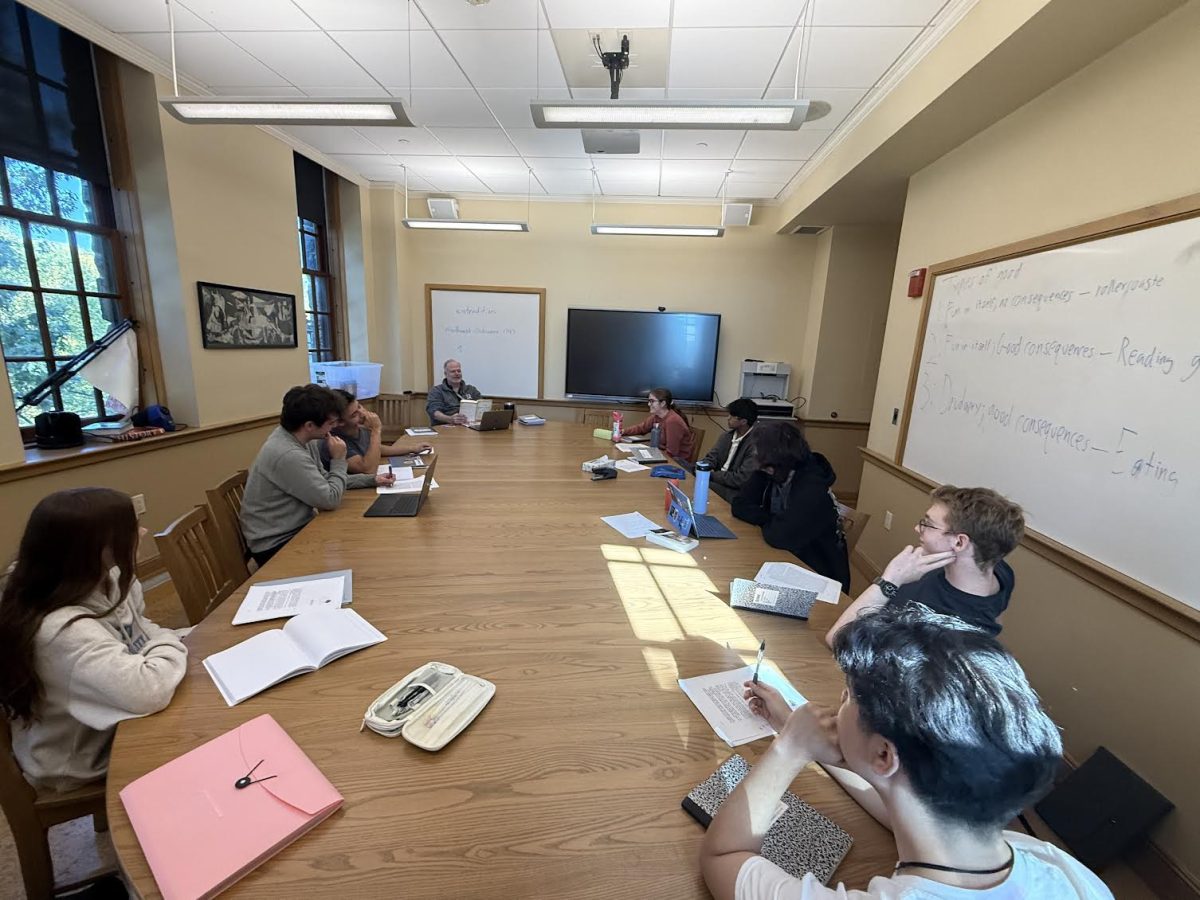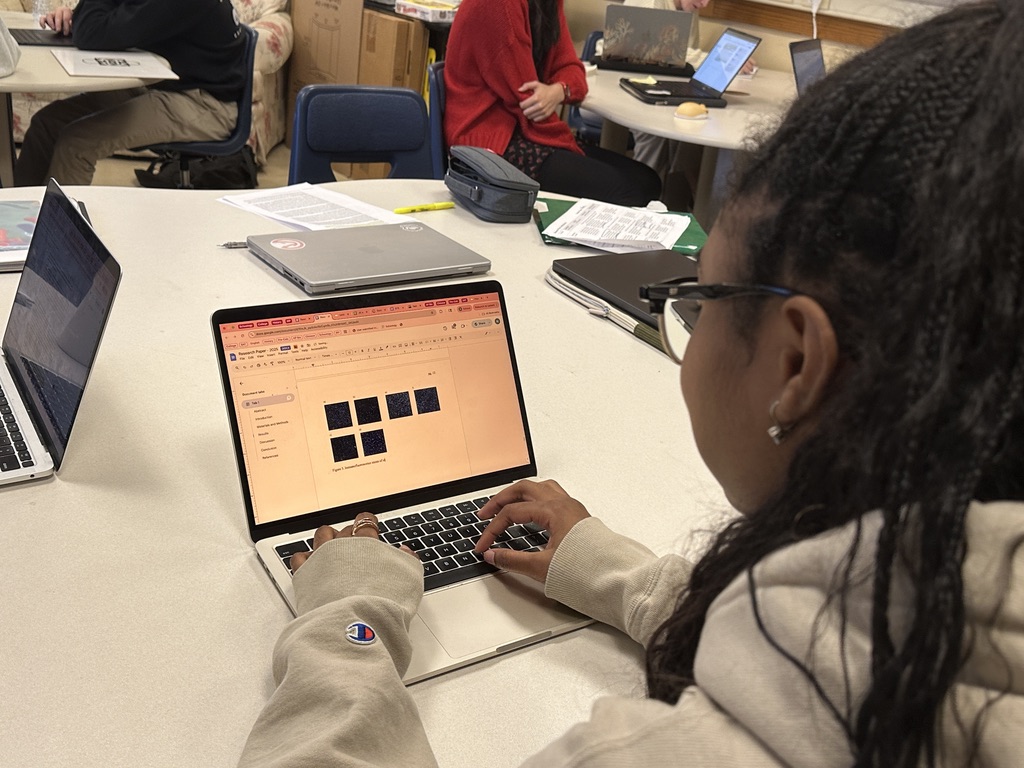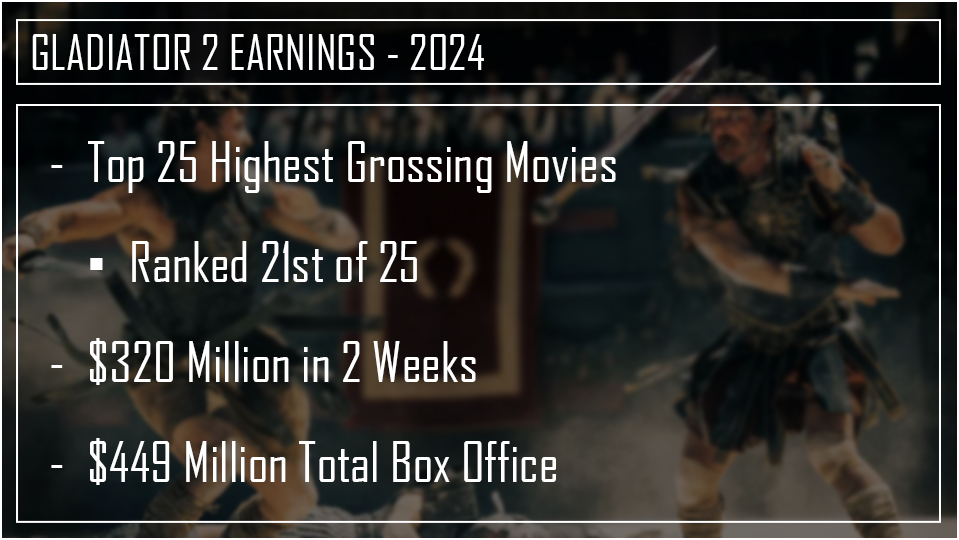The math department has always been aware that taking math classes can sometimes feel unfair to students who may not be “math people.” Math department chair, Mrs. Kaplan, wants to provide more options for students, and with three course levels, teachers can be more flexible with the curriculum.
In addition to providing different levels to account for all abilities, the math department is working to ensure students understand what the other levels are with new titles they hope are clearer. These new descriptive titles will be in use beginning in the 2025-2026 school year. In past years, the math department has only had two courses to choose from: Algebra II and Trigonometry, and Advanced Algebra II and Trigonometry. Not only did these courses have title descriptors that did not match the course rigor, but they also did not account for all types of math students. Installing three levels of Algebra II and Trigonometry with fitting descriptors will hopefully increase inclusivity on all ends of the spectrum.
Hackley students often think that the names of courses are not important, but the reality is not so simple. Students plan course selection every year, and many feel drawn to courses labeled as AP, advanced, or accelerated without investigating the course content itself. While students need a teacher’s recommendation to enroll in these higher-level courses, that does not relieve students from overworking themselves and selecting too many challenging classes even when they may not qualify. Although most courses with official AP or advanced designations are in the STEM field, Hackley’s humanities departments offer equally demanding coursework, even without these formal labels.
At the end of the 2023-2024 academic year, the Math Department added another level of Algebra II and Trigonometry. Now, going into the 2025-2026 school year, the math department has also tweaked the name for each designated level. With this change, students can select Algebra II and Trigonometry, Algebra II and Trigonometry Accelerated, or Algebra II and Trig with Advanced Problem Solving.
Before the 2024-2025 course change, the math department only had two classes to select from: Algebra II and Trigonometry, and Advanced Algebra II and Trigonometry. The change that the math department underwent last year was adding more selection to the curriculum with the addition of (regular) Algebra II and Trigonometry. This change credited students who were previously in Algebra II and Trigonometry with a label that correctly depicts the rigor taught in the classroom. Last year, Algebra II and Trigonometry became Advanced Algebra II and Trigonometry, and the advanced course became Accelerated Algebra II and Trigonometry.
Renaming the course names last year allowed the math department to properly describe rigor, and the benefit for students is a better-tailored understanding of the curriculum and more autonomy over what class will lead to success. The “less” advanced course (Algebra II and Trigonometry) eliminates the problem of having students stress themselves out in what was previously called Advanced Algebra II and Trigonometry, potentially not earning the best grades, only to get to Pre-Calculus and have the option to choose from three course levels.
According to Math Department Chair Diana Kaplan, “We have three levels of Pre-Calculus, so it makes sense to have three levels of Algebra II and Trigonometry that will funnel into those, and the second component is what we were calling Algebra II and Trigonometry was pretty advanced, so no course material changed.”
Mrs. Kaplan wants to emphasize that the course material in what is now called Algebra II and Trigonometry Accelerated did not change from the previous Advanced Algebra II, or even in 2023-2024, the Regular Algebra II and Trigonometry class. Instead, the third level of Algebra II and Trigonometry (Algebra II and Trigonometry with Advanced Problem Solving) has new material. Mrs. Kaplan feels this change will give students more credit than they were previously given regarding the old Algebra II and Trigonometry class. This is the first year in which Algebra II and Trigonometry have no advanced curriculum and work to include a space for non-math identifying students.
“Now we have a class for students who may not love math. Algebra II and Trigonometry is a required course, and now we have classes that supply every student’s needs,” said Mrs. Kaplan.
The regular Algebra II and Trigonometry class has more projects that focus on real-world scenarios.
Mrs. Kaplan emphasized that it is not necessary to spread oneself thin in a class with the “better” title just to end up in a class better tailored for them the next year. It is important to create a balance of different courses, as every student has their own passion. The math department urges students to recognize that. Just because a class has a more rigorous title does not mean students should feel forced out of other classes they may find more interesting and that are better suited to their needs.
Mrs. Kaplan understands that students may feel reluctant to indulge in a course that may be perceived as easy, or the easy way out. Perspective is something that will forever linger, but a true understanding of what the course is can help relieve some of these judgments.
“Why take a class where you are going to feel bad about yourself, not do well, have a not great grade, and struggle all year with it, and then still go regular Pre-Calculus, when you can now just go the regular route?” Mrs. Kaplan said.
If students were to embrace the advanced classes head-on, they may take the work and difficulty as it comes. Some students believe the more rigorous label will give students a preconceived idea that the class will be hard, which will add pressure in the future. Nonetheless, sophomore Josh Gandelmen said that it is no secret that the accelerated class (Algebra II and Trig with Problem Solving) is fast-moving, but with proper preparation, he feels he can better thrive at his level and be successful in the future.
“I honestly think that if the class had a normal name without the label, then it would be easy, but because it has the name of accelerated, it makes it hard,” said Josh Gandelmen.
Sophomore Owen Spencer decided to drop down a level, and he thinks that the addition of new math classes isn’t taking everyone into account.
“I do think it’s helpful just because there is a wide range of skill levels, but I think they are adding classes on the wrong end of the spectrum; students wanting to drop down don’t really know where to go,” said Owen.
The math department tried out these three levels during the 2023-2024 academic year. A new tailored Algebra II and Trigonometry displayed inclusivity and a unique project-based learning experience, but the labels were still misleading. Hearing advice from math students like Owen Spencer propelled the Math department to solidify three levels with the same curriculum in 2023-2024 and with adequate names and descriptions for students who may feel stuck between one or another.
For the 2025-2026 school year, to take Algebra II and Trigonometry, a student must have taken Algebra I and Geometry with no required grade. According to the Hackley US Course Descriptions 2025-2026, Algebra II and Trigonometry are designed to give students of the course the concepts needed to apply Algebra II and Trigonometry as well as prepare them for Pre-Calculus in the next year.
A distinctive component of this course is the focus on real-world scenarios. Next, to enroll in Algebra II and Trigonometry Accelerated, you must have a B or above in Algebra I and Geometry. This course focuses more on the niti griti numbers and equations, providing a holistic view of both Algebra II and Trigonometry.
Students must be prepared to cover functions, quadratic and linear equations, and logarithmic functions. Finally, towards the end of the year, students will focus their energy on Trigonometry, mainly learning trigonometric functions with an emphasis on algebraic and geographical reasoning. Finally, Algebra II and Trig with Advanced Problem Solving require more prerequisites, such as an A in Algebra I and Geometry. Students will also be expected to sit for a readiness test in the spring before taking the class. This is due to the pace and extreme rigor. This class is specially designed for students who plan to take and excel in higher mathematics in the future.
These course descriptions and prerequisites are designed to help students reflect on past math experiences and carefully choose a course for the following school year that matches their math trends and hopes for the future.
Junior Elliore Karger, who takes Algebra II and Trigonometry said, “I think that the math class is really easy, and we don’t get loads of homework, and it’s not a stressful class at all because we take it pretty slowly, and we make sure that everybody understands everything and it is not very overwhelming, unlike the advanced course.”
This is a perfect example of why Algebra II and Trigonometry were created. Everyone goes at their own pace and has their own goals. Juniors Calliope Yanuzzi and Ellorie consider themselves good at math, along with other subjects. For them, balancing math with other courses and being able to take a class that is “fun” is truly an enhancement to their daily schedules. They believe the class is a safe space free of judgment.
It is hard not to be misled by names, but it is more important for students to understand at what level they are best able to thrive. With three courses available for Algebra II and Trigonometry, there are more options in the curriculum, and students can curate their own paths and find comfort in math through more project-based foundations.












